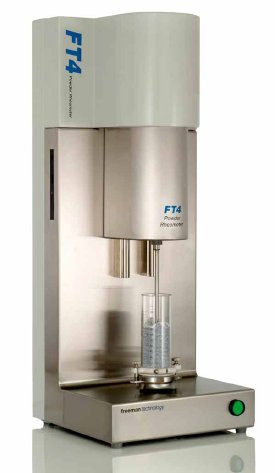Mar 28 2008
Researchers at the University of Bath (UK) are using the FT4 Powder Rheometer from Freeman Technology to understand and optimise the performance of dry powder inhalers (DPIs). Recently published data highlight a direct correlation between the flow properties of excipient powders, measured with the FT4 under aerating conditions, and the effectiveness of drug delivery of carrier based DPI formulations. The research will also be presented at RDD Respiratory Drug Delivery 2008 (11-15 May, Arizona, USA) by Drs Jagdeep Shur and Robert Price of the Pharmaceutical Surface Science Group, Department of Pharmacy and Pharmacology, University of Bath.
 The FT4 powder rheometer from Freeman Technology.
The FT4 powder rheometer from Freeman Technology.
Relatively coarse excipient particles are used to improve the flow properties of the micronized active pharmaceutical ingredients (APIs) used in DPIs. As a patient inhales, drawing air through the device, the resulting blend is fluidised, stripping API from the excipient, for deposition in the lung. This process is promoted by the inclusion of excipient fines.
With the FT4, a universal powder tester, samples can be characterised under aerating/fluidising conditions. In this research the instrument was used to measure aerated flow energy, bulk density, compressibility and permeability for various DPI blends. A direct correlation was observed between aerated flow energy and fine particle dose – the amount of formulation deposited in the lung - which both increased with increasing fines.
The results suggest that higher fines concentrations increase the resistance of the bed to flow, ultimately subjecting the powder to higher aerodynamic drag forces during fluidisation. These forces encourage the removal of API from the excipient, enhancing drug delivery to the lung.